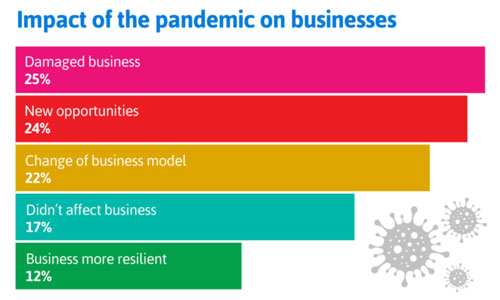The COVID pandemic and soaring costs have not dented the ambition of the UK’s sole traders and small business owners, according to new research.
Small business owners are determined to thrive after two years’ of unprecedented challenges thrown at them by the COVID pandemic. The annual survey of Donut website users, conducted by Atom Content Marketing in December 2021, has found that 56% of small business owners say they expect their business to do better in 2022 and 70% say they plan to grow their business and grasp new opportunities.
These results echo the findings of last week’s report by Small Business Britain and TSB which found that 66% of business owners say they expect their business to grow in 2022.
However, the ambition of the UK’s freelancers and small business owners is tempered by realism in the face of on-going challenges. Donut users were asked to name their biggest worries for 2022. The top concerns are:
- Rising prices and costs (19%);
- The state of the economy (14%);
- Further COVID restrictions (14%);
- Wellbeing and work/life balance (12%);
- Tax rises (11%);
- Cashflow and funding (11%).
Despite these challenges, the findings show that only 7% of those polled said they expect their business to do worse in 2022, while 14% expect it to do the same and 56% said it would do better. The results also found that just 4% are planning to exit their business this year, while for 23% the focus is on getting back to business as usual. Seven in ten (70%) are looking for growth.

Looking back at the past two years, it seems that the pandemic has impacted the small business community in many ways, not all of it negatively:
- 25% said the pandemic had damaged their business;
- 24% said it had brought new opportunities;
- 22% said it had made them change their business model;
- 17% said they weren’t affected;
- 12% said it made them more resilient.
When asked to name the single most important thing that had helped their business survive the pandemic, 36% of respondents cited a shift to online, 26% said adaptability, 20% said government financial support, 15% said hard work and 14% said they used their own funds.
When it comes to assessing the government response to the pandemic and the help it gave to UK businesses, it seems the jury is still out - 37% of those polled said they were neither satisfied or unsatisfied with government support. And while 35% described themselves as satisfied or very satisfied, one in four of those polled (25%) were not satisfied.
Interestingly, when it comes to getting business advice, just 17% of business owners said they use government information - significantly down from over 50% in 2020. Instead, business advice websites, including the Donuts, were the most popular source of advice. Other key sources of guidance include professional organisations and trade bodies.
Another key role the government will play in the coming years is supporting businesses as they take steps to reach net zero carbon emissions. The poll asked business owners how they were currently approaching the net zero goal. The findings show that a worrying 48% are yet to take any steps at all, either saying that they have no plans in this area (32%) or that they are waiting for government guidance and funding (16%). One in four (39%) say they have already taken steps to reduce carbon emissions in their business and 10% say they are determined to reach net zero in their business as soon as possible.
See the full findings on the Start Up Donut.
Written by Rachel Miller.
